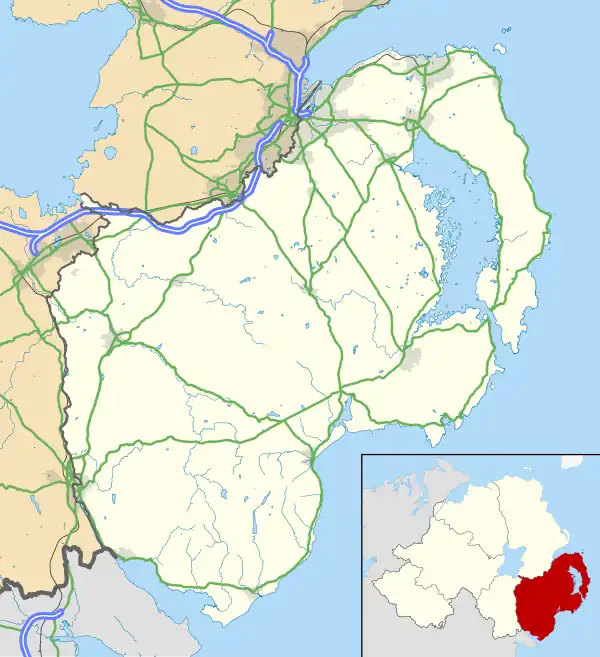Ballinran Court Tomb
 Approximate site of Ballinran tomb | |
 Location in County Down, Northern Ireland | |
| Location | County Down, Northern Ireland |
|---|---|
| Coordinates | 54°4′26.5″N 6°10′35.2″W / 54.074028°N 6.176444°W |
| Type | Court tomb |
| Length | 12m |
| History | |
| Founded | c. 3000 BC |
| Periods | Neolithic |
| Cultures | Celtic |
| Site notes | |
| Excavation dates | 1976 |
| Archaeologists | A. E. P. Collins |
Ballinran Court Tomb (sometimes known as the Giant's Grave) is situated close to Killowen, County Down, Northern Ireland, on the shore of Carlingford Lough. The site was excavated in April and May 1976 in preparation for a road widening project.[1][2] The excavation revealed the remains of a large court tomb, despite the absence of visible surface features.
Location and Historical References
The tomb is situated just south of the Rostrevor–Kilkeel road, in proximity to the shore of Carlingford Lough. It was first recorded in the 1858 Ordnance Survey Revision Name Book and appeared on early editions of the six-inch Ordnance Survey maps.[3] By the late 19th century, the monument had largely been destroyed, though its location remained accurately marked on subsequent maps.
Structure and Layout
The excavation uncovered a burial gallery consisting of five or six segments, aligned approximately north–south, with the forecourt facing the Mourne Mountains. The gallery featured stone sockets for orthostats, some of which contained packing stones or fragments of the original stones. The forecourt was asymmetrical, with better preservation on the western side. No evidence of the original cairn covering survived, suggesting it had been removed prior to the first edition of the Ordnance Survey map.
Finds
No trace of burial deposits was found in situ, although some cremated, presumably human, bone and three primary flint flakes were found.[1] A 'nest' of winkle shells (Littorina littorea) were found placed in a pit as a secondary deposit in the grave.[4] Artifacts recovered from the site were minimal. There was also a child's slate pencil, an iron ring (likely a harness fitting). The presence of 19th-century items within the stone sockets suggests post-destruction disturbance and re-use of the site.
References
- ^ a b "Ballinran". Excavations.ie. Archived from the original on 21 May 2005. Retrieved 6 December 2009.
- ^ Collins, A. E. P. (1976). "A Court Grave at Ballinran, County Down". Ulster Journal of Archaeology. 39: 8–12. ISSN 0082-7355. JSTOR 20567763.
- ^ "Ordnance Survey of Ireland, Down - Sheet 54 (Revised 1901–1902, Published 1904)". National Library of Scotland. 1904. Retrieved 29 July 2025.
- ^ O'Sullivan, Aidan & Breen, Colin (2007). Maritime Ireland. An Archaeology of Coastal Communities. Stroud: Tempus. pp. 70–71. ISBN 978-0-7524-2509-2.